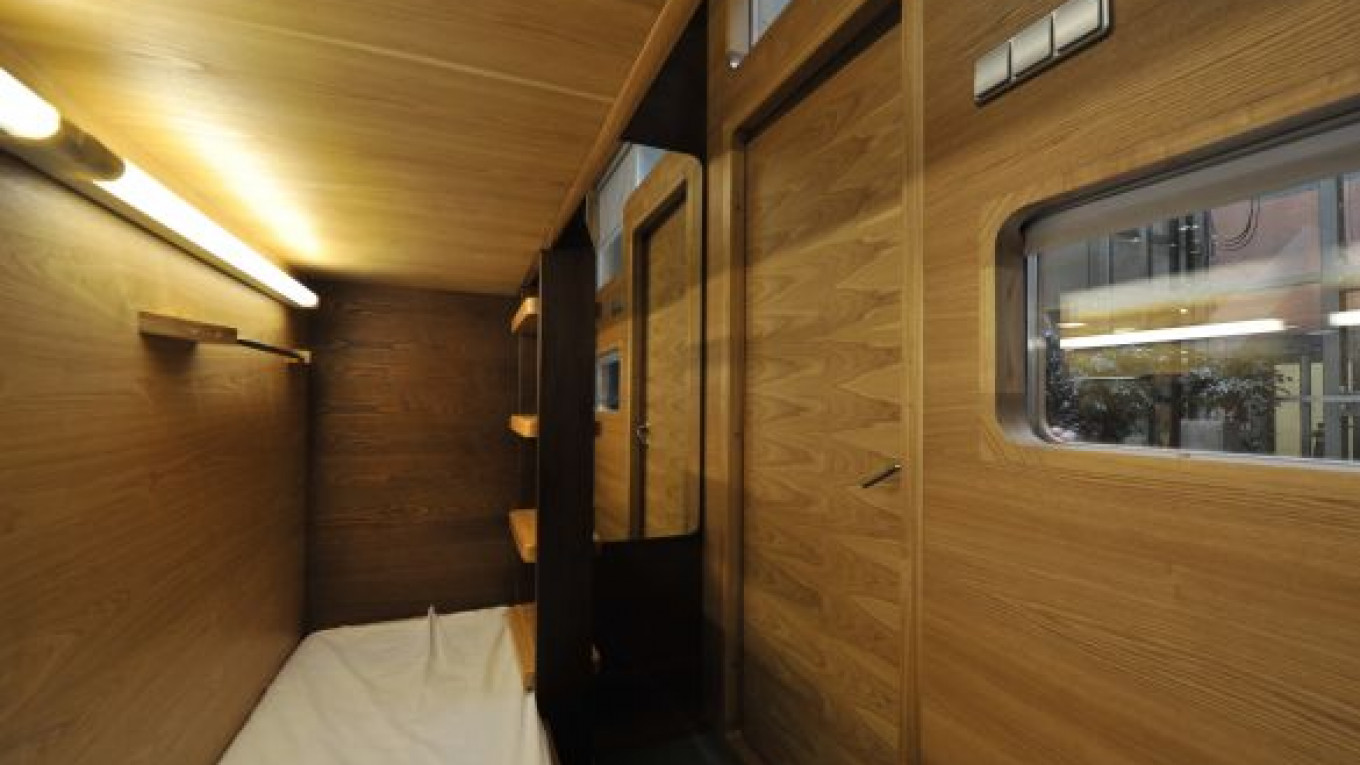Sleep-deprived travelers with their bodies crunched on plastic chairs, feet up on luggage cases and makeshift pillows made out of jackets are a common sight in airports around the world.
But Russians have found an escape route from this misery.
The Moscow-based Arch Group Architectural Bureau is offering travelers the first glance at the Sleepbox — a 2-by-1.5-meter soundproof capsule complete with a bed, ventilation system, luggage space and manager standing by to hand out clean bedsheets.
A prototype of the Sleepbox is now on display at the Aeroexpress train terminal at Sheremetyevo Airport. This model is not operational and will be used only for market research and exhibition purposes, said Vadim Semikin, director of communications at Aeroexpress.
Mikhail Krymov, co-director of Arch Group, said he is confident that the Sleepboxes will be fully operational in Russia within a year. Arch Group is already in negotiations to sell the boxes to some Russian clients, although Krymov declined to name names.
"These boxes will be put up across Russia, that is for certain," Krymov said. "It will just take some time."
Sleepboxes are designed for use in railroad stations, airports, exhibition centers, malls, hotels and hospitals and would cost about $10 per hour to rent, Krymov said.
The capsules received a lot of interest around the world after Arch Group presented the first designs two years ago. The company has since built an economy-class version of the Sleepbox, which is slated to cost about $10,000 and is the one on display at the Moscow airport.
Krymov says the company is working on a luxury version, which could have an Internet router, mood lighting, matte film on its windows with changing transparencies, a television, safe deposit box and built-in payment station with magnetic keys. The price for this deluxe model is still not set.
Companies in Europe and Africa are particularly interested in getting the Sleepboxes, but Russian airport officials are still not convinced. Krymov said the Sleepboxes will likely first appear in Russian hostels, and only later at transportation venues — where getting agreements to set them up is more difficult due to security considerations.
Aeroexpress officials will not make a decision whether to order the Sleepboxes before the winter, while they gauge travelers' response to the box on display, Semikin said.
"They are just using our terminal for an exhibition," Semikin said of the chosen location for the prototype Sleepbox.
Capsule hotels already exist in Japan, but Krymov said the Japanese versions are not as comfortable because they only have a mattress and no place to store luggage.
"They look like coffins and remind people of the morgue," he said. "That sort of atmosphere is not pleasant."
Japanese developers are not directly competing with their Russian counterparts, since the Sleepbox project does not have equivalents in the world, Krymov said.
Arch Group's other projects also stand out for their uniqueness. They have designed a garden shed with transparent ceiling and walls that allow in maximum light and make it easy to find stored tools and accessories.
The company's Swift Nest is a golf ball-shaped artificial bird's nest several meters in diameter that is designed to be attached to the corner of apartment buildings, to help small birds find a suitable nesting site. The balls also light up at night to display the number of the building.
The company has not received any orders for the nests yet, Krymov said.
A Message from The Moscow Times:
Dear readers,
We are facing unprecedented challenges. Russia's Prosecutor General's Office has designated The Moscow Times as an "undesirable" organization, criminalizing our work and putting our staff at risk of prosecution. This follows our earlier unjust labeling as a "foreign agent."
These actions are direct attempts to silence independent journalism in Russia. The authorities claim our work "discredits the decisions of the Russian leadership." We see things differently: we strive to provide accurate, unbiased reporting on Russia.
We, the journalists of The Moscow Times, refuse to be silenced. But to continue our work, we need your help.
Your support, no matter how small, makes a world of difference. If you can, please support us monthly starting from just $2. It's quick to set up, and every contribution makes a significant impact.
By supporting The Moscow Times, you're defending open, independent journalism in the face of repression. Thank you for standing with us.
Remind me later.






